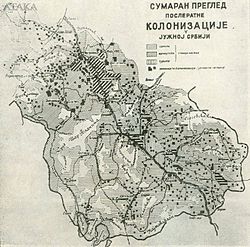In Countries
Kosovo

During the disintegration of Yugoslavia, the term entered again in political discourse. [7] In 1989, Rugova opposed the "de-albanization" of Kosovo. [8] In 1992, the Serbian Radical Party recommended that Kosovo be "de-albanized". [9] After the riots in Kosovo, Slobodan Milošević implemented a policy of "dealbanization" similar to those in 1918. [10] [11] In political discourse in Serbia, the call for dealbanizacija as it became an unrealistic goal after the Kosovo War gave way to a more pragmatic - as viewed from the Serbian perspective - call for federalizacija (the political attempt to keep Kosovo Albanians within a Serbia with broad autonomy) across the political spectrum. [12]
Republic North of Macedonia
The ultras of FK Vardar, one of the biggest clubs in North Macedonia have frequently unveiled a banner with the call for dešiptarizacija during the club's football matches. In 2017, such an incident was followed by an attack against Albanian youngsters who were walking outside the stadium. [6]